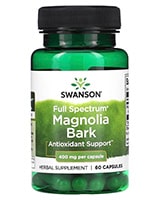

Magnolia Bark, derived from the Magnolia tree, has been a cornerstone in traditional Chinese medicine for centuries, offering a range of health benefits. Modern research supports its use for various conditions, from mental health to chronic diseases. This article explores ten key benefits of Magnolia Bark, grounded in scientific evidence.
1. Anxiety Relief
Magnolia Bark is known for its potent anxiolytic properties[1]Xue, L., Zhang, J., Shen, H., Ai, L., & Wu, R. (2020). A randomized controlled pilot study of the effectiveness of magnolia tea on alleviating depression in postnatal women. Food Science & Nutrition, 8(3), 1554-1561. https://doi.org/10.1002/fsn3.1442, providing a natural alternative to conventional anxiety medications. Studies indicate that compounds in Magnolia Bark, such as magnolol and honokiol, interact with the brain’s GABA receptors, promoting relaxation without the side effects commonly associated with pharmaceuticals like diazepam.
2. Anti-Cancer Properties
Emerging research highlights Magnolia Bark’s potential in cancer prevention[2]Arora, S., Singh, S., Piazza, G. A., Contreras, C. M., Panyam, J., & Singh, A. P. (2012). Honokiol: A novel natural agent for cancer prevention and therapy. Current Molecular Medicine, 12(10), 1244. https://doi.org/10.2174/156652412803833508 and treatment. Its active components, particularly honokiol, have been studied for their effects on various cancer types, including breast, lung, and colon cancers. These compounds are believed to inhibit cancer cell growth and induce apoptosis, offering a complementary approach to traditional cancer therapies.
3. Improved Sleep Quality
Magnolia Bark’s sedative effects can enhance sleep quality[3]Liu, L., Liu, C., Wang, Y., Wang, P., Li, Y., & Li, B. (2015). Herbal Medicine for Anxiety, Depression and Insomnia. Current Neuropharmacology, 13(4), 481-493. https://doi.org/10.2174/1570159X1304150831122734, making it a beneficial supplement for those struggling with insomnia or sleep disturbances. Unlike many sleep aids, Magnolia Bark offers a natural solution to achieve restful sleep without the risk of dependency or grogginess the following day.
4. Antidepressant Effects
The antidepressant properties of Magnolia Bark are linked to its ability to modulate neurotransmitters involved in mood regulation, such as serotonin and dopamine. This natural remedy may help alleviate symptoms of depression by restoring neurotransmitter balance in the brain, presenting a promising alternative to SSRIs and other pharmaceutical antidepressants.
5. Anti-Inflammatory Benefits
Magnolia Bark exhibits significant anti-inflammatory properties, which can be beneficial in managing chronic inflammatory conditions[4]Walker, J. M., Maitra, A., Walker, J., Ehrnhoefer-Ressler, M. M., Inui, T., & Somoza, V. (2013). Identification of Magnolia officinalis L. bark extract as the most potent anti-inflammatory of four plant extracts. The American Journal of Chinese Medicine, 41(3), 531-544. https://doi.org/10.1142/S0192415X13500389. The active compounds, magnolol and honokiol, have been shown to suppress the production of pro-inflammatory cytokines, thereby reducing inflammation and potentially mitigating the risk of diseases like arthritis, cardiovascular disease, and diabetes.
6. Antioxidant Properties
Rich in antioxidants, Magnolia Bark helps neutralize harmful free radicals in the body[5]Borgonetti, V., & Galeotti, N. (2023). Honokiol-Rich Magnolia officinalis Bark Extract Attenuates Trauma-Induced Neuropathic Pain. Antioxidants, 12(8). https://doi.org/10.3390/antiox12081518, protecting cells from oxidative stress and damage. This action supports overall cellular health and may play a role in preventing aging-related diseases, including neurodegenerative disorders such as Alzheimer’s disease.
7. Neuroprotection
Magnolia Bark’s neuroprotective effects are of particular interest for cognitive health and the prevention of neurodegenerative diseases. Research suggests that its compounds can protect neurons from damage, support brain health, and improve cognitive functions. These benefits are attributed to its anti-inflammatory and antioxidant activities, which help maintain the integrity of brain cells.
8. Weight Management
Some studies indicate that Magnolia Bark may assist in weight management[6]Garrison, R., & Chambliss, W. G. (2006). Effect of a proprietary Magnolia and Phellodendron extract on weight management: A pilot, double-blind, placebo-controlled clinical trial. Alternative Therapies in Health and Medicine, 12(1), 50-54. PMID: 16454147 by affecting the body’s fat storage and stress-related eating habits. Its compounds have been linked to reduced body weight in animal studies, suggesting a potential for helping to manage obesity and metabolic syndrome in humans.
9. Dental Health
Magnolia Bark has shown promising results in promoting dental health[7]Ghorbani, F., Haghgoo, R., Aramjoo, H., Rakhshandeh, H., Jamehdar, S. A., & Zare-Bidaki, M. (2021). The antibacterial effect of Magnolia mouthwash on the levels of salivary Streptococcus mutans in dental plaque: A randomized, single-blind, placebo-controlled trial. Iranian Journal of Microbiology, 13(1), 104-111. https://doi.org/10.18502/ijm.v13i1.5499. Its antibacterial properties are effective against oral pathogens, contributing to the prevention of tooth decay, gum disease, and bad breath. Research highlights the use of Magnolia Bark extracts in mouthwashes and chewing gums to improve oral hygiene and health, underscoring its potential as a natural dental care product.
10. Heart Health
The cardiovascular benefits of Magnolia Bark are linked to its anti-inflammatory and antioxidant effects. Studies suggest that it may help lower blood pressure, reduce arterial stiffness, and manage cholesterol levels[8]Lipert, A., Szadkowska, I., Matusiak-Wieczorek, E., & Kochan, E. (2022). The Effect of Herbal Supplements on Blood Pressure: Systematic Review and Meta-Analysis. Antioxidants, 11(8). https://doi.org/10.3390/antiox11081419, all of which are critical factors in maintaining heart health and preventing cardiovascular diseases. By supporting healthy blood vessel function and reducing inflammation, Magnolia Bark can be a valuable addition to a heart-healthy lifestyle.
Conclusion
Magnolia Bark offers a wide range of health benefits, from mental wellness and sleep improvement to cancer prevention and heart health. Its natural compounds, magnolol and honokiol, are the key to its therapeutic properties, providing anti-inflammatory, antioxidant, and neuroprotective effects. As interest in natural remedies continues to grow, Magnolia Bark stands out for its versatility and potential to support overall health and well-being.
Embracing Magnolia Bark as part of a holistic approach to health can offer a natural, effective way to address various health concerns. Whether used for stress relief, sleep support, or chronic disease prevention, Magnolia Bark exemplifies the power of nature in promoting health and wellness.
Buy Magnolia Bark Online Review Comparison Table
 Magnolia Bark | iHerb | 60 pills (400mg) | $5.09 |  Worldwide, AU | Visit Website >> |
References
| ↑1 | Xue, L., Zhang, J., Shen, H., Ai, L., & Wu, R. (2020). A randomized controlled pilot study of the effectiveness of magnolia tea on alleviating depression in postnatal women. Food Science & Nutrition, 8(3), 1554-1561. https://doi.org/10.1002/fsn3.1442 |
|---|---|
| ↑2 | Arora, S., Singh, S., Piazza, G. A., Contreras, C. M., Panyam, J., & Singh, A. P. (2012). Honokiol: A novel natural agent for cancer prevention and therapy. Current Molecular Medicine, 12(10), 1244. https://doi.org/10.2174/156652412803833508 |
| ↑3 | Liu, L., Liu, C., Wang, Y., Wang, P., Li, Y., & Li, B. (2015). Herbal Medicine for Anxiety, Depression and Insomnia. Current Neuropharmacology, 13(4), 481-493. https://doi.org/10.2174/1570159X1304150831122734 |
| ↑4 | Walker, J. M., Maitra, A., Walker, J., Ehrnhoefer-Ressler, M. M., Inui, T., & Somoza, V. (2013). Identification of Magnolia officinalis L. bark extract as the most potent anti-inflammatory of four plant extracts. The American Journal of Chinese Medicine, 41(3), 531-544. https://doi.org/10.1142/S0192415X13500389 |
| ↑5 | Borgonetti, V., & Galeotti, N. (2023). Honokiol-Rich Magnolia officinalis Bark Extract Attenuates Trauma-Induced Neuropathic Pain. Antioxidants, 12(8). https://doi.org/10.3390/antiox12081518 |
| ↑6 | Garrison, R., & Chambliss, W. G. (2006). Effect of a proprietary Magnolia and Phellodendron extract on weight management: A pilot, double-blind, placebo-controlled clinical trial. Alternative Therapies in Health and Medicine, 12(1), 50-54. PMID: 16454147 |
| ↑7 | Ghorbani, F., Haghgoo, R., Aramjoo, H., Rakhshandeh, H., Jamehdar, S. A., & Zare-Bidaki, M. (2021). The antibacterial effect of Magnolia mouthwash on the levels of salivary Streptococcus mutans in dental plaque: A randomized, single-blind, placebo-controlled trial. Iranian Journal of Microbiology, 13(1), 104-111. https://doi.org/10.18502/ijm.v13i1.5499 |
| ↑8 | Lipert, A., Szadkowska, I., Matusiak-Wieczorek, E., & Kochan, E. (2022). The Effect of Herbal Supplements on Blood Pressure: Systematic Review and Meta-Analysis. Antioxidants, 11(8). https://doi.org/10.3390/antiox11081419 |

Leave a Reply